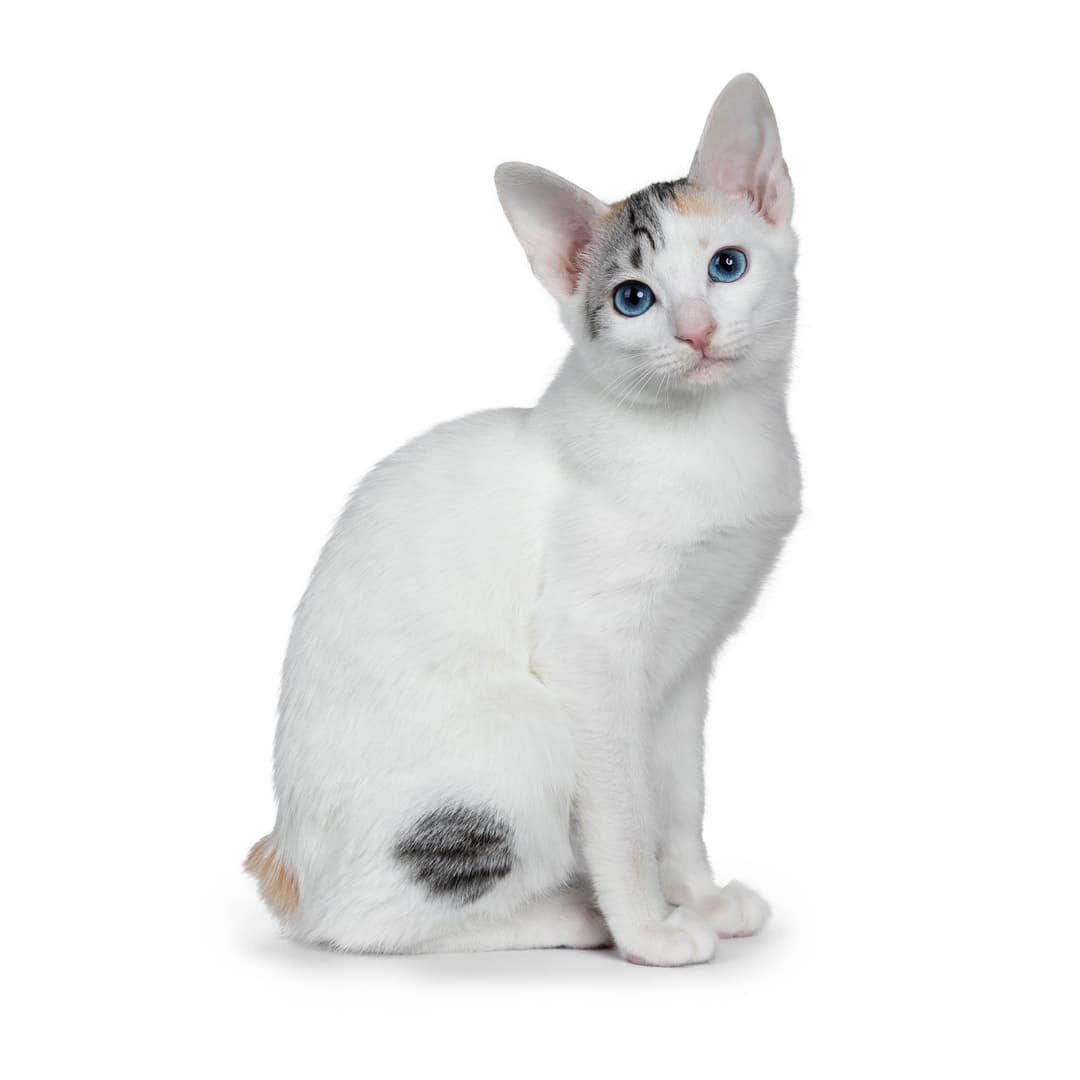Discover your cat's connection to this breed and 20 others


Discover your cat's connection to this breed and 20 others



The Japanese Bobtail is an affectionate and friendly cat best known for its gentle nature, sweet personality, and signature pom-pom tail. They are fun-loving kitties who truly cherish every moment with their favorite humans.
Japanese Bobtails are relatively small to medium-sized cats, with triangular heads, pointed ears, and oval. eyes Their hind legs are slightly longer than their front legs. Their coat can be either short or long, but it is always very soft and dense. They come in a variety of colors and patterns, but calico and bi-color versions are most common. The typical color combinations are black-and-white or red-and-white.
The most distinctive feature of the Japanese Bobtail is a short, pom-pom tail. It is one of the few cat breeds with a naturally occurring stubby tail that isn't associated with skeletal disorders. This short tail is a cat body-type mutation caused by the expression of a dominant gene. Therefore, all kittens of a litter of at least one Bobtail cat will also have kinked
tails.
Legend says that the Japanese Bobtail is an ancient cat breed that was originally gifted to the emperor of Japan over 1000 years ago. A tricolor cat with a bobbed tail, much like the Japanese Bobtail, is actually a symbol of good fortune in Japan, hence their popularity there. In the 1600s, this lucky cat became a common Japanese "street cat", as Japanese authorities decreed that all cats should be set loose to help deal with rodents.
The true origin story, however, remains a mystery, as genetic analysis showed that the Japanese Bobtail isn't actually genetically similar to other Japanese cats. What we do know,
however, is that the first known person to import this breed to the United States was Elizabeth Freret in 1968. The short hair variety was given Championship status by the Cat Fanciers' Association in 1976, and the long hair variety in 1993. Even though there are numerous breeders across the U.S., Europe, and Japan, the breed is still rather rare.
The Japanese Bobtail is a charming, fun and lovable cat that enjoys every moment with their favorite humans. Due to their quiet, gentle and affectionate personalities, they get along
well with children and other pets. These kitties are highly intelligent and usually known for their playful and mischievous nature. This is the kind of cat that you can work with very well if you'd like to teach them a few tricks. They also love water and will gladly enjoy an occasional splash from your hand, the faucet, or a puddle. They also love to fetch!
The Japanese Bobtail is overall a fairly healthy cat breed with very few health issues. Their kinked tail has not been associated with any health issues, and it does not represent a health concern. However, these cats can be prone to obesity, so you may want to keep a close eye on those treats! Weekly grooming should suffice in terms of coat care.
Bobtails mean good fortune in Japan. In Japan, all cats were always loved, but the iconic Japanese “waving cat” figurine (the Maneki-Neko or the Beckoning Cat) was especially valued as it was believed to bring good financial fortune to its family. The Beckoning
cat depicts the Japanese Bobtail.
The Japanese Bobtail is not related to other short-tailed cats. Despite sharing such a prominent and similar feature, the Japanese Bobtail is not genetically similar to other short-tailed cats, such as the American Bobtail or the Manx. This is because they don't share the same genetic mutation for stubbed tails.
They are one of the chattiest cat breeds out there. This intelligent and active cat is very talkative, and it will communicate with you regularly with a very wide range of meows and
chirps. Some people describe their Japanese Bobtail's voice as singing-like.
No two tails are the same. The naturally-occurring stubbed tail characteristic for the breed can be kinked and bent in my different ways, and it is said that no tail can resemble another one.
They are exceptional jumpers. Because their hind legs are longer than their front legs, they are exceptionally great at jumping. This makes them one of the more agile domestic cats out there.
FETCH by WebMD "What to Know About the Japanese Bobtail"
The International Cat Association (TICA) “Introduction to the Japanese Bobtail”
Recommended by top vets with decades of experience
21 breeds
64 genetic health markers
50 genetic trait markers
